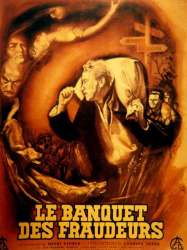The General Line is a russe film of genre Drama directed by Sergueï Eisenstein
The General Line (1929)
ou

If you like this film, let us know!
The General Line, also known as Old and New (Russian: Старое и новое, translit. Staroye i novoye), is a 1929 Soviet film directed by Sergei Eisenstein and Grigori Aleksandrov.
The General Line was begun in 1927 as a celebration of the collectivization of agriculture, as championed by old-line Bolshevik Leon Trotsky. Hoping to reach a wide audience, the director forsook his usual practice of emphasizing groups by concentrating on a single rural heroine. Eisenstein briefly abandoned this project to film October: Ten Days That Shook the World, in honour of the 10th anniversary of the Revolution. By the time he was able to return to this film, the Party's attitudes had changed and Trotsky had fallen from grace. As a result, the film was hastily re-edited and sent out in 1929 under a new title, The Old and the New. In later years, archivists restored The General Line to an approximation of Eisenstein's original concept. Much of the director's montage-like imagery—such as using simple props to trace the progress from the agrarian customs of the 19th-century to the more mechanized procedures of the 20th—was common to both versions of the film.
Synopsis
Dans un village traditionnel, Marfa Lapkina est une pauvre paysanne qui ne possède même pas un cheval. Les koulaks, les paysans riches, refusent d'aider les plus pauvres. Marfa considère le communisme comme son seul espoir. Avec l'appui de jeunes communistes et de responsables du parti, elle lance l'idée d'une coopérative, un kolkhoze. Grâce au kolkhoze, les paysans apprennent le travail en commun et découvrent la mécanisation.Comments
Leave comment :
Suggestions of similar film to The General Line
There are 18 films with the same director, 61877 with the same cinematographic genres, 747 films with the same themes, to have finally 70 suggestions of similar films.If you liked The General Line, you will probably like those similar films :
 , 30minutes
, 30minutesDirected by Sergueï Eisenstein
Origin Russie
Genres Drama
Themes Politique, Films about the labor movement, Political films
Actors Erast Garine, Boris Zakhava, Stanislav Rostotski
Rating66%





Because Bezhin Meadow was repeatedly edited, re-shot, and changed to satisfy the Soviet government authorities, several versions of the film were created.

Strike (1925)
, 1h18Directed by Sergueï Eisenstein, Grigori Alexandrov
Origin Russie
Genres Drama
Themes Politique, Films about the labor movement, Political films
Actors Grigori Alexandrov, Anatoly Kuznetsov
Rating75%





На заводе всё спокойно / At the factory all is quiet Using typography, the word "но" (but) is added to the title of the chapter which then animates and dissolves into an image of machinery in motion.
 , 1h29
, 1h29Directed by Karel Reisz
Origin United-kingdom
Genres Drama, Romance
Themes Films about the labor movement
Actors Albert Finney, Shirley Anne Field, Rachel Roberts, Hylda Baker, Norman Rossington, Peter Madden
Rating74%





Arthur Seaton is a young machinist at a Nottingham factory. He is determined not to be tied down to living a life of domestic drudgery like the people around him, including his parents, whom he describes as "dead from the neck up". He spends his wages at weekends on drinking and having a good time.

The Brigade (2017)
, 1h30Directed by Pierre Jolivet
Origin France
Genres Drama
Themes Films about the labor movement
Actors Roschdy Zem, Émilie Dequenne, Michaël Abiteboul, Matthieu Albertini, Jean-François Malet
Rating61%





Bénédicte, adjudant-chef, intègre une caserne de pompiers à Bram dans le sud de la France, dirigée par Philippe. Une région ravagée par de nombreux incendies, criminels ou non. Lors d'une mission pour un accident de la route, Bénédicte ne voit pas une victime qui reste dans le coma à l'hôpital. Touchée, elle pense à quitter la brigade alors que Philippe tente de la convaincre de rester.

Juke Girl (1942)
, 1h30Directed by Curtis Bernhardt
Origin USA
Genres Drama, Crime
Themes Films about the labor movement
Actors Ann Sheridan, Ronald Reagan, Richard Whorf, George Tobias, Gene Lockhart, Alan Hale
Rating62%





This script must be run from the command line

Smuggler's Ball (1952)
, 1h30Directed by Henri Storck
Genres Drama, Comedy
Themes Films about the labor movement, Documentaire sur le monde du travail
Actors Françoise Rosay, Jean-Pierre Kérien, Daniel Ivernel, Yves Deniaud, Paul Frankeur, André Valmy
Rating64%





Ce film expose le cas d'un village belge traversé par trois frontières : l’Allemagne, les Pays-Bas, la Belgique. Il retrace l'univers des travailleurs, celui des douaniers et celui des fraudeurs… Henri Storck tisse entre tous ces acteurs une intrigue commune et aborde des thèmes sociaux et économiques.

The Molly Maguires (1970)
, 2h4Directed by Martin Ritt, Oscar Rudolph
Origin USA
Genres Drama, Thriller, Historical
Themes Films about the labor movement, Political films
Actors Sean Connery, Richard Harris, Samantha Eggar, Frank Finlay, Bethel Leslie, Anthony Zerbe
Rating67%





The Molly Maguires were a secret organization of Irish coal miners established in nineteenth century Pennsylvania to fight oppressive mineowners. Led by Jack Kehoe (Sean Connery), they plant dynamite to destroy plant shafts and equipment. As character James McParlan, Richard Harris portrays real life Pinkerton Detective James McParland who was employed to infiltrate the Mollies.

Grand Froid (2017)
, 1h26Origin France
Genres Drama, Comedy, Comedy-drama
Themes Films about the labor movement
Actors Jean-Pierre Bacri, Arthur Dupont, Olivier Gourmet, Stéphane Bissot, Féodor Atkine, Marie Berto
Rating57%





Dans une petite ville perdue au milieu de nulle part, le commerce de pompes funèbres d’Edmond Zweck bat de l’aile. L’entreprise ne compte plus que deux employés : Georges, le bras droit de Zweck, et Eddy, un jeune homme fraîchement arrivé dans le métier. Un beau matin, pourtant, un mort pointe son nez. L’espoir renaît. Georges

Roots of Blood (1978)
, 1h34Directed by Jesús Salvador Treviño
Genres Drama
Themes Films about the labor movement, Political films
Actors Ernesto Gómez Cruz, Pepe Serna
Rating69%






Mister Taxi (1952)
, 1h15Directed by André Hunebelle
Origin France
Genres Drama, Comedy, Comedy-drama
Themes Transport films, Films about the labor movement, Films about automobiles
Actors Michel Simon, Louis de Funès, Jane Marken, Claire Olivier, Jean Brochard, Roland Alexandre
Rating62%





Monsieur Taxi comes across a bag a passenger seems to have forgotten on the backseat. The bag contains a considerable amount of money and he is desperate to return it. While trying to find the owner of the bag he is eventually taken for a criminal and arrested by police. But in the end everything is straightened out and he lives to see his both children get married.
 Connection
Connection